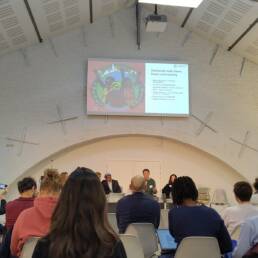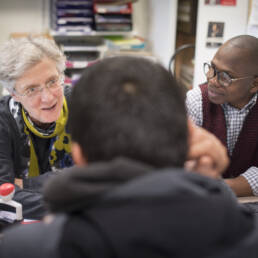Author
Ariela Mitri
Head of Sector
Anti-trafficking and Migration
Caritas Albania
Human trafficking reduces many men, women and children to slavery… Its aim is to exploit them for cheap labour, for the sex trade, for the trade of organs, to force them to beg or to engage in delinquency… the routes of migration are also often used by traffickers and exploiters to recruit new victims of trafficking…it is a crime against humanity.
Pope Francis
Trafficking in human beings is a serious crime and a gross violation of human rights, which can be classified as a modern form of slavery. It occurs all over the world and affects almost every country as an origin, transit or destination country, or sometimes a combination of all. The global scale of human trafficking is difficult to quantify, due to the hidden nature of the crime. Figures often may have been based on conflicting definitions or compiled for different purposes and are therefore seldom comparable. Trafficking in human beings is often linked with other forms of organised crime. According to the United Nations, it is considered the second source of illicit profits for organised criminals after those obtained from the drugs trade. Caritas over the world is committed to the fight against trafficking with a special focus on the sale of children, women and men into slavery as beggars, prostitutes and forced labourers.
From September 2011 to December 2019, 15 Caritas organisations of the Euro-Mediterranean region participated in a joint anti-trafficking project, the ‘Euro-Mediterranean Anti-Trafficking Network’: Caritas Albania, Caritas Armenia, Caritas Bosnia and Herzegovina, Caritas Bucharest/Romania, Caritas Kosovo, Caritas Jordan, Caritas Lebanon, Caritas Middle East and North Africa, Caritas Ruse/Bulgaria, Caritas Slovenia, Caritas Slovakia, Caritas Spain, Caritas Turkey, Caritas Ukraine and Caritas France. The project started as there was a need to undertake joint actions in different countries, which have suffered from different forms of trafficking in one way or another. There was a need for all actors working on anti-trafficking in these countries to cooperate in order to take adequate, adapted and efficient decisions to protect victims of trafficking. Considering that some Caritas members have a long experience in working on various anti-trafficking projects, they could easily work together on these demeaning practices by also empowering each other to respond to the crisis.
The main goal of the project was to strengthen cooperation among Caritas organisations so that through training programs and the development of common tools they could strengthen their skills and capacities as well as their advocacy campaigns targeting the European Union and national/regional organisations. New members have joined the Network over the past nine years. The main reasons that led organisations to join the Network include the lack of programmes and expertise on human trafficking in their country, while the need to develop projects has increased due to increased migration and population movements; the belief that membership in the Network might improve the quality of existing national projects; and the transnational nature of human trafficking. Better skills, increased visibility and new partnerships at national, regional and international levels are a clear added value for the project partners and their organisations.
Within the project, several communication tools were developed for internal and external purposes. The members have improved their capacities and are now able to transfer the new skills to other experts and volunteers in their organisations and to implement new practices. This has led to a significant improvement in the protection of vulnerable victims of trafficking, particularly women, children and vulnerable populations, and in their access to services. At national and international levels, Caritas organisations have increased their visibility, which has created new links or reinforced existing ones with public authorities, allowing the issue of trafficking to be better addressed. Joint awareness-raising and advocacy activities have had a strong impact at national and international levels: the results of the joint action-research, based on the members’ contributions, were shared with and included in reports of international organisations (see also the Network’s first report from 2016). In addition, the strengthening of links between Caritas organisations has contributed to the emergence of new projects between countries to strengthen the fight against trafficking.
Finally, the Euro-Mediterranean Anti-Trafficking Network’s collaborative processes and experiences were considered so positive that they led to the creation of a new working group on the theme of migration, which includes several members of the Network. Caritas organisations work effectively in partnership and will continue to work together on human rights issues.
This experience of collaboration has been particularly successful because of the combination of professional and personal approach, as part of a common engagement to combat human trafficking in Bosnia and Herzegovina and in the region. Together, we are stronger if government institutions and the civil sector share values and knowledge in combating this modern phenomenon.
Sanja Horvat, Project Manager at Caritas Bosnia and Herzegovina












